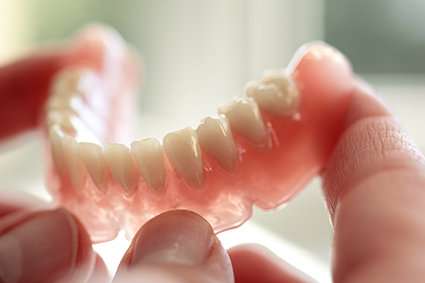Over 50s with fewer than 20 teeth at higher risk of musculoskeletal frailty

New research by scientists at King's College London has found that tooth loss may contribute to musculoskeletal frailty in the over 50s, with those with fewer than 20 teeth being at greatest risk.
Published in Geriatrics & Gerontology International on 11 December, the research led by Dr Wael Sabbah, from King's College London Dental Institute, examined the overall health of 9,338 Americans aged 50 years and older. The final analysis involved an examination of the frailty of 924 males and 928 females, who had a mean age of 62.9 years.
Participants were categorised into three groups: those having at least 20 teeth, denture wearers with less than 20 teeth, and non-denture wearers with less than 20 teeth. The groups were tested using a combination of interviews (focusing on nutritional intake), clinical examinations—including handgrip strength tests, and BMI and oral health assessments, to calculate frailty.
Results from the study indicated that those with more than 20 teeth were significantly less likely to be frail than those with less than 20 teeth who did not use dentures. This group was also found to have consumed the greatest amount of nutrients over the study period.
Conversely, the group that had less than 20 teeth and did not use dentures, and those who used dentures, were found to have consumed the least amount of nutrients, when compared to the Recommended Dietary Intakes recommended by the US food and drug administration.
Although not tested, the King's team believe that the lack of nutrients being taken on board by denture wearers could be attributed to their inability to eat specific foods. Although dentures improves masticatory function, their bite force is much weaker than that of natural teeth, meaning users may avoid certain foods.
The King's research highlights the important need for older people to be able to maintain the ability to not just chew, but to chew effectively, in order to take on board the essential nutrients necessary to maintain muscle mass and stave off musculoskeletal frailty.
Speaking about the research Dr Sabbah said: "Few studies have examined the relationship between oral health, particularly periodontal disease, the number of teeth and general frailty. While others have argued that older adults who need dentures were more likely to be frail, there were few attempts to explain the underpinning cause of the relationship.
"One of the important findings of the study is the significant relationship between the condition of teeth and deficiency in intake of essential nutrients, regardless of the use of dentures. To date, the majority of efforts to improve frailty have focused on nutrition strategies, including health education, while the influence of teeth on dietary restraint of the elderly has been neglected.
"The findings of this analysis, along with that reported in earlier research, suggest that the use of denture could be a neglected intervention that could potentially have a preventative impact on musculoskeletal frailty. The results also highlight the importance of developing oral health policies to ensure older adults maintain functional dentition throughout their life."
More information: Seoyoung Lee et al. Association between number of teeth, use of dentures and musculoskeletal frailty among older adults, Geriatrics & Gerontology International (2017). DOI: 10.1111/ggi.13220















